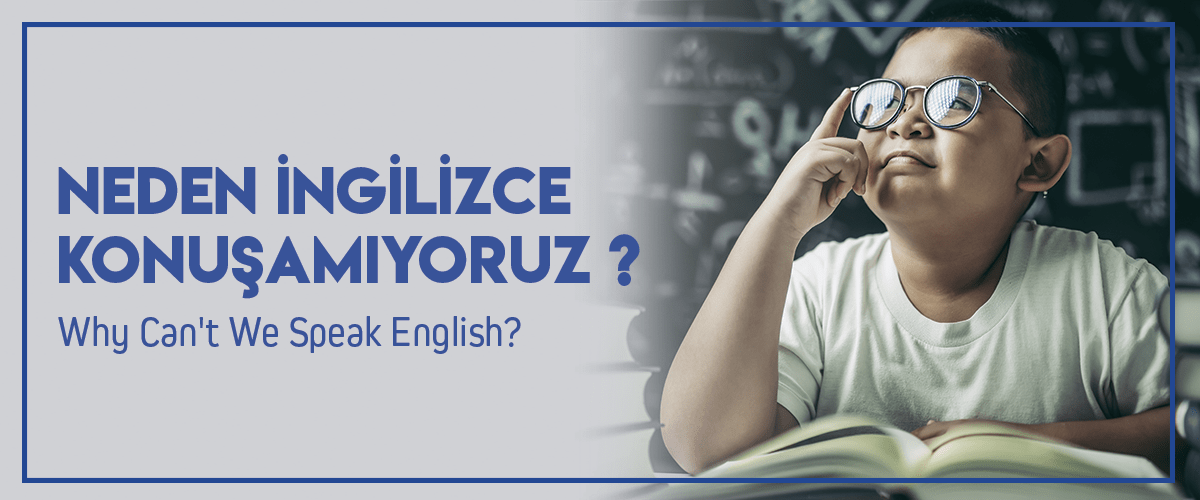Sonuç odaklı eğitim sistemi ve İngilizcenin bir ihtiyaçtan ziyade gramer testi olarak görülmesi dil öğrenimi üzerindeki en büyük engeldir. Psikolog ve araştırmacı Ann Roe ortaya attığı psikolojik ihtiyaçlar, bir kişi hangi alana ve yöne enerjisini yöneltirse o alana ilgi ve başarısı artar, görüşü dil öğrenimi konusunda da kendi düşüncelerimi desteklemektedir. Bizler İngiliz dilini yalnızca sınavlarda çıksın A, B, C, D veya E şıklarından doğru şıkkı işaretleyelim şeklinde öğrendik ve doğru şıkları işaretleyenler İngilizce biliyor kabul edildi. YÖK dil, YKS veya YDS gibi sınavlara girip yüksek puan alanların dile hâkim oldukları, dili iyi konuştuğu kabul edildi. Bu görüş ve anlayış neticesinde öğrencilerde “sınavlarda konuşma testi (speaking) yok neden ona çalışayım ki? veya benim hedefim yüksek puan almak bu yüzden speaking gerek yok” anlayışına sebep oldu. İngilizcede bu duruma washback etkisi denmektedir. Hangi kazanımları öğretirseniz onu sınavlarda sormanız lazım öteki türlü öğrendikleriniz havada kalır (negative washback etkisi). Çünkü öğrenciler tüm enerjisini sınavda ne sorulacak ise ona yoğunlaştırırlar, sorulmayacak veya test edilmeyecek bilgi öğrenciler tarafından gereksiz kabul edilir. Bunun en büyük destekleyicisi öğrenciler genelde “hocam sınavda ne çıkacak” sorusunu sorarken = sonuç odaklı soru; öğrenmedikleri yerler sınav dahil değilse merak etmek veya öğrenmek istemezler.
Benimsenen eğitim politikası her ne kadar konuşma yetkinliği (communicative competence) vurgu yapsa ve sınıf içi grup ve bireysel konuşma egzersizlerinin sayısı öğrenme kitabında fazla olsa da ; hiçbir zaman bir İELTS, TOEFL gibi sınavlarda olduğu gibi konuşma yetkinliği -akıcılık, doğru konuşma, vurgu ve tonlamaya dikkat etme- test edilmez. Bu tür durumlarda öğretilmesi amaçlanan kazanımlar havada kalır ve öğrenci tarafından benimsenmez. Çünkü öğrencinin, velilerin temel amaç ve gayesi alınan yüksek nottur. Bu amaç doğrultusunda da öğrenciler İngilizceyi şıklara hapsedip günlük konuşma dilini ihmal ederler. Lise son sınıf öğrencilerinin İngilizce dersinde sayısal, sözel veya eşit ağırlık konularına önem vermesi de aynı sebepledir. Dil öğrencileri hariç asla İngilizce soruları sorulmaz hatta asla İngilizce konuşma yetkinlikleri test edilmez. Dil öğrencileri de her ne kadar İngilizce sınavına girseler de yeterli miktar gramer ve kelime bilgisi ile çoğu soruyu doğru yapıp İngilizce öğretmeni adayı olurlar. Bu kişiler yine aynı sebepten ötürü gittikleri Üniversiteler ’de yine dili konuşma gereksinimi çok duymazlar çünkü birkaç ders haricince dili kullanma yetkinlikleri test edilmez. Hatta ilginç bir şekilde İngilizce öğretmenliği lisans müfredatında eğitim dersleri çok daha önemlidir ortalama yapabilmeleri için. Bu koşullarda kişi ancak kendisini konuşma pratiği yapma, yabancılarla konuşma gibi etkinliklerle donatarak dili konuşma yeteneğini geliştirebilir. Bunun içinde buna psikolojik bir ihtiyaç duymalı ve tüm enerjisini bu alana yönlendirmelidir.
Ayşegül TAŞDEMİR
Why Can’t We Speak English?
The result-oriented education system and seeing English as a grammar test rather than a need are the biggest obstacles to language learning. Psychologist and researcher Ann Roe put forward the psychological needs, the interest and success of a person in whichever field and direction he directs his energy increases, his opinion supports my own thoughts on language learning. We have learned the English language only in the exams, let’s mark the correct option from A, B, C, D or E and those who marked the correct options were considered to know English. It is accepted that those who take exams such as YÖK language, YKS or YDS and get high scores have good command of the language and speak the language well. As a result of this view and understanding, students “don’t have a speaking test in exams, why should I study for it? Or my goal is to get a high score, so speaking is not necessary ”. In English, this is called the washback effect. You have to ask what learning outcomes you teach in exams, otherwise what you learn will not complete (negative washback effect). Because students focus all their energy on what is asked in the exam, information that will not be asked or tested is considered unnecessary by students. While students who are the biggest supporter of this usually ask the question “What will my teacher be in the exam?” Result-oriented question; They don’t want to wonder or learn if parts they don’t learn are not included in the exam.
Although the educational policy adopted emphasizes communicative competence and the number of in-class group and individual speaking exercises is high in the learning book; Speaking competence – fluency, correct speech, paying attention to emphasis and intonation – is never tested like in an IELTS or TOEFL exam. In such cases, the acquisitions intended to be taught remain in the air and are not adopted by the student. Because the main purpose and purpose of students and parents is the high grade. For this purpose, students confine English to stylish and neglect daily speaking language. It is the same reason that high school students attach importance to numerical, verbal or equal weight issues in English lessons.
Except for language learners, English questions are never asked and never even tested for their English speaking proficiency. Although language students take the English exam, with sufficient grammar and vocabulary, they become candidates for English teachers by doing most of the questions correctly. For the same reason, these people do not need to speak the language much at the universities they go to because their competence in using the language is not tested except for a few lessons. Interestingly enough, in the English language teaching undergraduate curriculum, the training courses are much more important for them to average. Under these conditions, the person can only improve his / her ability to speak the language by equipping himself / herself with activities such as practicing speaking and speaking to native speakers. In this, it should have a psychological need and direct all its energy to this area.
Ayşegül TAŞDEMİR


